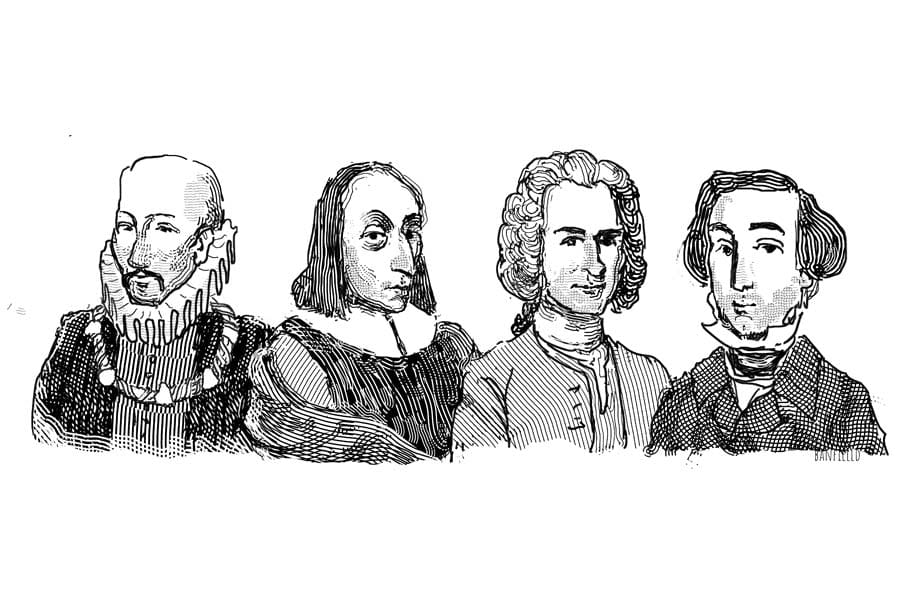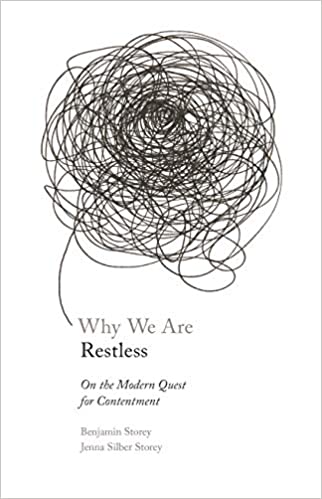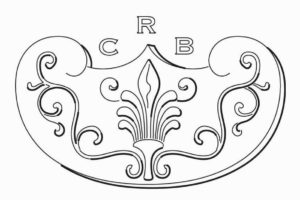Book Reviewed
We have an inalienable right to pursue happiness, but are we any good at it? Do we ever achieve happiness, or does the mode of our pursuit push away its satisfaction? Do we substitute busyness for contentment? In agreement with Alexis de Tocqueville’s description of Americans as “restless in the midst of their well-being,” Benjamin and Jenna Silber Storey offer a philosophical genealogy of our unquiet minds and distracted spirits in Why We Are Restless: The Modern Quest for Contentment.
The brilliantly designed book jacket illustrates our condition: on the cover is a scribble-scrabble doodle, a tangled swirl, like a strand of yarn all looped and doubled and knotted. This husband-and-wife team of teacher-scholars at Furman University doesn’t aim to wind our disorder into a tidy ball. Instead, the Storeys perform an invaluable service in helping readers understand the various twists and turns of our agitated questing.
To disentangle the mess we’ve gotten ourselves into, the authors turn to the French and their tradition of moral observation and reflection. Like the moralistes, the Storeys are interested not in our fundamental right to choose but rather in how we exercise that right and what that means for our lives and characters. They have judiciously selected four guides across four centuries who formulate four strikingly different conceptions of human flourishing: Michel de Montaigne (1533–1592), Blaise Pascal (1623–1662), Jean-Jacques Rousseau (1712–1778), and Alexis de Tocqueville (1805–1859). The Storeys believe that tracing the radically different conceptions of human flourishing that have been in contention over the past half-millennium can help us acquire self-knowledge. Maybe knowledge of our inquiétude is the first step to a cure.
* * *
Beginning with Montaigne, the Storeys describe that immensely consequential shift from the “soul,” with its eternal longings, to the unencumbered “self.” They call the ideal of this new anthropology, which emerged to avoid the internecine conflict of Europe’s wars of religion, “immanent contentment.” Montaigne is the first to display, in winsome and eccentric personal detail, what it looks like to find happiness in the immediate and the mundane. He might have taken for his theme song Simon & Garfunkel’s “The 59th Street Bridge Song,” (a.k.a., “Feelin’ Groovy”):
I got no deeds to do, no promises to keep
I’m dappled and drowsy and ready to sleep
Let the morningtime drop all its petals
on me
Life, I love you, all is groovy.
This anti-heroic, low-key hedonism rejects the high-flown striving of pre-modern ideals, whether the warrior’s quest for honor, the philosopher’s quest for wisdom, or the believer’s quest for salvation. Montaigne paints the moderate joys of a more circumscribed life—cozy and comfortable, full of ever-various ordinary activities, social (hanging out with friends, traveling) but not political. Life taken on its own naturalistic terms generates a moral standard of sorts, with sincerity prized above all. This new human type will have certain associated characteristics; Montaigne, true to his moral skepticism, calls these “non-reproachable qualities,” rather than “virtues.” So, for instance, he/she/they/co/per/ve/zie/or what-you-will will be generously lax in judging others, leaving them to tend their own pleasure gardens.
* * *
Pascal wasn’t having any of this nonchalant worldliness. For him, “l’homme passe l’homme”—“man transcends man.” As the Storeys recount, Pascal believed that any attempt to live in a fashion that denies the truth of our being is fated to fail:
Indeed, the quest for immanent contentment leaves the restless human heart more anxious than ever, for modernity’s very success in remaking the world in man’s image allows us to see, with terrifying clarity, that a human life is not the sort of problem a psychological stratagem can solve.
Just as the Storeys give a sympathetic portrait of Montaigne’s “art of ordinary life,” they present an equally appreciative account of Pascal’s thoroughgoing rejection of relaxed humanism. In each case, they provide enough well-chosen biographical detail and historical context (particularly fascinating in Pascal’s case) to bring the thinker to life, while keeping the focus on the ideas in dialogue with one another. The dialogue here proceeds point by point, as the mathematical genius Pascal “perceives the disturbing existential consequences of the modern scientific revolution” (to which he notably contributed) and discovers the antidote in the other pole of his thought: his religious conversion to Jansenism, an austere Augustinian movement that challenged the permissive and powerful Jesuits, who were casuistically willing to reach accommodations with the outspreading spirit of Montaigne. (The book’s description of the Jesuits as “in the business of allowing ambitious, worldly, passionate people to do most of what they want to do while remaining Catholics in good standing” can’t help but remind of the contemporary Jesuit pope’s meeting with the abortion-supporting Joe Biden.)
* * *
Beneath the seeming satisfaction that modern selves find in their lives of sequential distraction and diversion, Pascal espies misery—the misery of a being ineluctably aware of its mortality and ignorance. We try to deceive ourselves and structure social life to connive at that self-deception. Pascal is ruthless in exposing our profound imperfection, declaring that “all men naturally hate one another.” Each individual, down deep, intuits that that hatred is deserved, for “[t]he truth of the self is tyranny.” From Pascal’s unflinching perspective, Montaigne’s intimate and celebrated friendship with Étienne de la Boétie was as bereft of real connection as are today’s more obviously self-referential, curated friendships based on shabby “likes” and emojis.
This misery is not the whole story, however, for the obverse of our misery is our greatness. This greatness begins in awareness of our misery and takes its direction from our ability through thought to encompass the universe, to imagine infinity, and to seek God. According to Pascal (as summarized by the Storeys), “[s]uch seeking in anguish is the one rational response to a clear-eyed, undistracted assessment of our natural condition.” Reason itself indicates rationalism’s poverty and the need for what surpasses understanding, namely, the “dimension of grace or supernature” which makes a new, soulful, whole-hearted life possible, including joyous love of others.
* * *
Enter Rousseau, whom the Storeys present in search of a tertium quid, somewhere between the “intentional shallowness of Montaigne” and the “intransigently Christian depth of Pascal.” Rousseau agreed with Pascal about the hollowness of the Enlightenment’s promises. But he did not gaze heavenward. In seeking to combine depth with naturalness, he identified a different cause for our unhappiness, and thus a different solution. The problem, as he saw it, was not alienation from God but from ourselves. Because this alienation had evolved through historical accidents, it could perhaps be, if not reversed (mere animal happiness being no longer possible), at least remedied by creative choice. The Storeys explore the antipodal paths by which Rousseau “reimagines the standard of immanent contentment in the light of Pascal’s critique of it.” In place of Montaigne’s tepid balance, Rousseau recommends extremism, remaking human beings in quest of psychic coherence. Be a citizen and nothing but a citizen. Or be a bohemian wandering on the fringes of society. Above all, go “all in” to escape the miserable condition of the bourgeois who is capable of neither community nor self-sufficiency.
In addition to the clearly incompatible choices of citizen and solitaire, Rousseau experimented with a third option. In his “most ambitious effort,” he tried to “have it all,” both belonging and independence. In his philosophical novel Émile, through the marriage of Émile and Sophie, “he will depict the immanent contentment and unmediated approbation achieved by a man and woman raised from birth to form a whole together, even as they retain their natural independence from the corruptions of social life.” As the Storeys note, Rousseau’s vision of the happy household is “the image of immanent contentment most vivid to the contemporary imagination.” (Why else do we have gay marriage today?) The domestic bliss sketched by Rousseau, grounded as it is in organs of satisfaction, has a natural and powerful hold on us that Montaigne’s beautiful friendship and Pascal’s Christian charity do not. Nonetheless, Rousseau himself saw the problems that would plague the modern pursuit of happiness through companionate marriage: “The more we seek completion in the couple, the more we risk being shattered by the brute facts of human vacillation and vulnerability.” Romantic love is fragile, and even when the love is strong, the partners are fragile.
The Storeys’ verdict on what Rousseau called his “sad and great system” is that Rousseau was correct: his quest for wholeness was great in that he rigorously thought through—and even tried out various versions of—“the immanent principles upon which our modern pursuit of happiness is built,” but it was sad, even tragic, in its repeated failures. There is “no satisfying way forth from our contradictions,” so long as we remain on the plane of immanence.
* * *
To this point, the Storeys’ biography of modern restlessness had not said much about politics. They do note that Montaigne’s counsel of withdrawal into a private realm is compatible with the emergence of limited government, à la John Locke, whose purpose is to protect and provide scope for that private pursuit of happiness. They also note that Rousseau had more to say about political life, especially in his persona as “a citizen of Geneva” and an admirer of Sparta; however, in none of his incarnations was he a defender of limited government. It is only with their final thinker that political analysis assumes center stage. In the United States, Tocqueville found that Montaigne’s mode of contentment had become the prerogative of all. He encountered “a world of men constantly in motion and on the make, whose defining characteristics are industriousness, the love of material well-being, and the restless hunger for change.” He investigates the political effects of this vast democratizing and nationalizing of Montaigne’s ideal.
The Storeys brilliantly recap Tocqueville, beginning with his remarks about the democratic suspicion of “forms” and instinctive hostility to authority. The result, they argue, is to leave individuals directionless. Denuded of structure and guidance, the quest for happiness becomes “haphazard and anxious.” In their boldest claim, they assert that what began in Montaigne as a teaching about limitation (allowing a private realm free from overmuch political interference) reaches a terminus in which immanence itself becomes angry and invasive: the “frustration with limits eventually rattles our thinking about politics. For it turns against the architecture of separations that is the hallmark invention of liberal prudence.”
* * *
At this point I wondered whether the Storeys should have taken account of a fifth Frenchman, the Baron de Montesquieu (1689–1755)—for if anyone is an expert on the separation of powers (including its psychological premises and effects), it’s the author of The Spirit of the Laws. In his famous treatment of England’s government in Book 11, chapter 6, Montesquieu sets forth the principle of tripartition. Later in the work he revisits England to explore the character or general spirit of a regime of balanced and separated powers. In Book 19, chapter 27, Montesquieu argues that restlessness (inquiétude), far from being a threat, is the psychic condition that keeps the system in equilibrium. Uneasiness animates the whole. This restlessness is the consequence of the freedom of the passions, including the passions of “hatred, envy, jealousy, and the ardor for enriching and distinguishing oneself.” Montesquieu is quite aware of the downsides of this “frenzy of liberty,” noting that such a people “would be unhappy while having so many grounds not to be so.” Nonetheless, he emphatically does not present this unhappiness, or other features like the poor reasoning of the people, or the coarse tone of public life (with its “empty clamors and insults”), as dangers to the constitutional order. If this is a disagreement between Montesquieu and Tocqueville, it would be important to know who is right, for the answer would greatly affect the solution to our present political discontents. The Storeys wonder “[w]hether the work of our age consists in renewing our liberal order or finding a new foundation for our common life.” The dialogue between Montesquieu and Tocqueville on inquiétude is crucial to that determination.
Throughout this excellent book, the Storeys provide a model for how the thought of the past can be made vital. Their final chapter is a fitting summons to a “genuine liberal education, which is ultimately an education in the art of choosing.” With the faith of true teachers, they hold out the hope that our modern quest for happiness can be transformed from “a slapdash sequence of locations, vocations, and vacations” into a “purposeful adventure” in self-knowledge.





